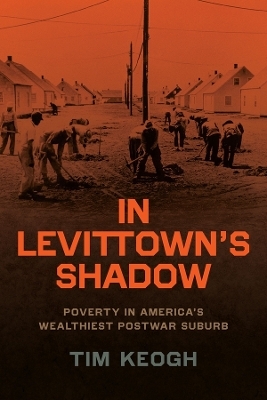
In Levittown’s Shadow
Poverty in America’s Wealthiest Postwar Suburb
Seiten
2023
University of Chicago Press (Verlag)
978-0-226-82775-9 (ISBN)
University of Chicago Press (Verlag)
978-0-226-82775-9 (ISBN)
Named one of the best nonfiction books of 2023 by Publishers Weekly!
There is a familiar narrative about American suburbs: after 1945, white residents left cities for leafy, affluent subdivisions and the prosperity they seemed to embody. In Levittown’s Shadow tells us there’s more to this story, offering an eye-opening account of diverse, poor residents living and working in those same neighborhoods. Tim Keogh shows how public policies produced both suburban plenty and deprivation—and why ignoring suburban poverty doomed efforts to reduce inequality.
Keogh focuses on the suburbs of Long Island, home to Levittown, often considered the archetypal suburb. Here military contracts subsidized well-paid employment welding airplanes or filing paperwork, while weak labor laws impoverished suburbanites who mowed lawns, built houses, scrubbed kitchen floors, and stocked supermarket shelves. Federal mortgage programs helped some families buy orderly single-family homes and enter the middle class but also underwrote landlord efforts to cram poor families into suburban attics, basements, and sheds. Keogh explores how policymakers ignored suburban inequality, addressing housing segregation between cities and suburbs rather than suburbanites’ demands for decent jobs, housing, and schools.
By turning our attention to the suburban poor, Keogh reveals poverty wasn’t just an urban problem but a suburban one, too. In Levittown’s Shadow deepens our understanding of suburbia’s history—and points us toward more effective ways to combat poverty today.
There is a familiar narrative about American suburbs: after 1945, white residents left cities for leafy, affluent subdivisions and the prosperity they seemed to embody. In Levittown’s Shadow tells us there’s more to this story, offering an eye-opening account of diverse, poor residents living and working in those same neighborhoods. Tim Keogh shows how public policies produced both suburban plenty and deprivation—and why ignoring suburban poverty doomed efforts to reduce inequality.
Keogh focuses on the suburbs of Long Island, home to Levittown, often considered the archetypal suburb. Here military contracts subsidized well-paid employment welding airplanes or filing paperwork, while weak labor laws impoverished suburbanites who mowed lawns, built houses, scrubbed kitchen floors, and stocked supermarket shelves. Federal mortgage programs helped some families buy orderly single-family homes and enter the middle class but also underwrote landlord efforts to cram poor families into suburban attics, basements, and sheds. Keogh explores how policymakers ignored suburban inequality, addressing housing segregation between cities and suburbs rather than suburbanites’ demands for decent jobs, housing, and schools.
By turning our attention to the suburban poor, Keogh reveals poverty wasn’t just an urban problem but a suburban one, too. In Levittown’s Shadow deepens our understanding of suburbia’s history—and points us toward more effective ways to combat poverty today.
Tim Keogh is assistant professor of history at Queensborough Community College, part of the City University of New York.
Introduction
1. The Future Detroit of the East
From Residential to Industrial Suburbia
2. The Crabgrass Wasn’t Always Greener
Poverty Amidst Suburban Plenty
3. Attics, Basements, and Sheds
Housing the Poor during the Suburban Boom
4. Fair without Full Employment
The Limits of Equal Opportunity
5. The Suburban War on Poverty
6. Shouldering Their “Fair Share”
Why the Suburbs Could Not Resolve the “Urban Crisis”
7. The Long Island Miracle
Suburbia into the Next Century
Conclusion
Lessons from Long Island’s Past
Acknowledgments
Appendix
List of Abbreviations
Notes
Index
| Erscheinungsdatum | 16.10.2023 |
|---|---|
| Reihe/Serie | Historical Studies of Urban America |
| Zusatzinfo | 13 halftones, 8 tables |
| Sprache | englisch |
| Maße | 152 x 229 mm |
| Gewicht | 426 g |
| Themenwelt | Geisteswissenschaften ► Geschichte ► Regional- / Ländergeschichte |
| Sozialwissenschaften ► Ethnologie | |
| Sozialwissenschaften ► Soziologie | |
| ISBN-10 | 0-226-82775-5 / 0226827755 |
| ISBN-13 | 978-0-226-82775-9 / 9780226827759 |
| Zustand | Neuware |
| Haben Sie eine Frage zum Produkt? |
Mehr entdecken
aus dem Bereich
aus dem Bereich
Erinnerungen
Buch | Softcover (2024)
Pantheon (Verlag)
16,00 €


